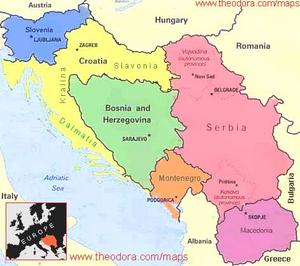 By Maarten den Heijer
By Maarten den Heijer
This week, Serbia assumed chairmanship over the Council of Europe’s Committee of Ministers. This caused a bit of a row, with Serbia’s opponents pointing out that a country which doesn’t cooperate satisfactorily with the Yugoslavia tribunal should not be able to chair an organization which has as primary purpose to defend human rights. Since chairmanship of the Council of Europe rotates every 6 months in alphabetical order, Serbia’s chairmanship was institutionally unavoidable. In this webcast, Serbia’s minister for foreign affairs Vuk Draskovic and Terry Davis, secretary-general of the Council of Europe, tell the press why Serbia is very well capable to preside the organization. Especially interesting are some of the answers Draskovic gives to questions from the press regarding a future solution for Kosovo. He criticizes Ahtisaari’s plan for an independent Kosovo (a plan supported by what Draskovic labels as the ‘holy trinity’ of the US, the UK and France). Ahtisaari had concluded that the situation in Kosovo reached an impasse which cannot be bridged and that therefore, independence is the only viable solution. Using plastic cups to illustrate the systematics of the UN Charter, Draskovic tells us that Serbia is ready to ‘build a bridge’ between the two opposing principles of territorial integrity of Serbia and the principle of self-determination for the Albanian people. His bridgeable solution is that Kosovo will remain within the Serbian state, ruled independently from Belgrade by the Albanese majority, and with its own special arrangements in the EU and other international organizations, except for the UN and NATO.  Draskovic is a highly elusive figure. In the nineties, he vehemently opposed Milosevic’ regime, promoting peace, democratic reforms and a pro-Western stance. At the same time, Draskovic is well known for rather extreme nationalist statements and has never liked the idea of an independent Kosovo. He also has a sense of humor. During the handover of the chairmanship he told his colleagues that Serbia is like Nokia: every year a new model – and every year it is smaller.
Draskovic is a highly elusive figure. In the nineties, he vehemently opposed Milosevic’ regime, promoting peace, democratic reforms and a pro-Western stance. At the same time, Draskovic is well known for rather extreme nationalist statements and has never liked the idea of an independent Kosovo. He also has a sense of humor. During the handover of the chairmanship he told his colleagues that Serbia is like Nokia: every year a new model – and every year it is smaller.
